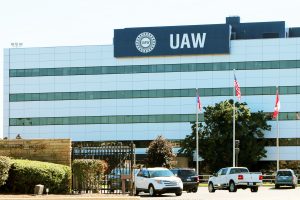 The United Auto Workers (UAW) claims it’s enacting “several reforms in an effort to prevent and root out corruption.” The union’s plan was announced by acting president Rory Gamble — who took over when former president Gary Jones stepped down after being accused of scheming to steal $700,000 in members’ dues.
The United Auto Workers (UAW) claims it’s enacting “several reforms in an effort to prevent and root out corruption.” The union’s plan was announced by acting president Rory Gamble — who took over when former president Gary Jones stepped down after being accused of scheming to steal $700,000 in members’ dues.
Since the union is still entrenched in a corruption investigation (which has resulted in thirteen federal charges to date), we have a few questions about its “reforms.”
1) The UAW will hire an “Ethics Ombudsman” to “receive, review, and respond to ethics complaints and allegations.” It will also hire an “Ethics Officer who will not be an employee of the International Union.”
Sounds good so far. But, this “Ethics Officer” appears to have little independent enforcement power. Any complaints have to be referred to this independent officer by the “Ethics Ombudsman or the [International Executive Board].” Then, it’s the IEB that must enforce the independent officer’s decision. But wait, wasn’t it members of the IEB who were corrupt in the first place? It seems foolish for workers to trust the IEB to not only refer a complaint to the Ethics Officer, but to enforce the officer’s decision as well.
If the UAW was serious about rooting out corruption, it would establish an independent officer who could investigate complaints directly from workers, with little-to-no involvement from the IEB.
2) The union says it will set up an “Ethics Hotline” for those who want to report a concern.
Nothing new here: The union provided a similar hotline for whistleblowers in the past. Women who tried to report pervasive sexual harassment at a Ford plant in Chicago said the hotline was essentially worthless. Why should workers believe this hotline will be any more effective?
3) The union plans to sell former president Dennis Williams’ cabin at the UAW’s Black Lake resort.
Selling the cabin seems to be the right thing to do, considering it was built for former president Dennis Williams — another official implicated in the corruption scandal. The money used to build the cabin was allegedly part of the millions of dollars funneled by union executives through the UAW’s training fund. That’s not to mention that at least part of the cabin was built using non-union labor. Given the cabin’s shady origin, does the union plan to put the profits from the cabin’s sale towards auto workers? UAW officials haven’t suggested that’s the plan.
Until these questions are answered, it looks like the union’s latest “reforms” are nothing more than a publicity stunt to help rebuild its crumbling reputation.



